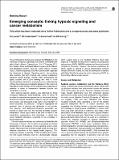Emerging concepts: linking hypoxic signaling and cancer metabolism
Author(s)
Lyssiotis, C A; Muñoz-Pinedo, C; Emerling, B M; Vander Heiden, Matthew G.
Downloadcddis201241.pdf (137.3Kb)
PUBLISHER_CC
Publisher with Creative Commons License
Creative Commons Attribution
Terms of use
Metadata
Show full item recordAbstract
The Joint Keystone Symposia on Cancer and Metabolism and Advances in Hypoxic Signaling: From Bench to Bedside were held in Banff, Alberta, Canada from 12 to 17 February 2012. Drs. Reuben Shaw and David Sabatini organized the Cancer and Metabolism section, and Drs. Volker Haase, Cormac Taylor, Johanna Myllyharju and Paul Schumacker organized the Advances in Hypoxic Signaling section. Accumulating data illustrate that both hypoxia and rewired metabolism influence cancer biology. Indeed, these phenomena are tightly coupled, and a joint meeting was held to foster interdisciplinary interactions and enhance our understanding of these two processes in neoplastic disease. In this report, we highlight the major themes of the conference paying particular attention to areas of intersection between hypoxia and metabolism in cancer. One opening keynote address was delivered by Craig Thompson (Memorial Sloan-Kettering, USA), in which he provided a comprehensive perspective on the current thinking around how altered metabolism supports cancer cell growth and survival, and discussed areas likely to be important for future discovery. In particular, Thompson highlighted the essential roles of glucose and glutamine in cell growth, how glucose- and glutamine-consuming processes are rewired in cancer and how this rewiring facilitates anabolic metabolism. These topics were at the core of many of the metabolism presentations that described in detail how some metabolic alterations contribute to the properties of transformed cells. The other keynote address was delivered by Peter Ratcliffe (University of Oxford, UK), in which he provided a historical perspective on the progress of how signaling events sense oxygen. Mammals have evolved multiple acute and long-term adaptive responses to low oxygen levels (hypoxia). This response prevents a disparity in ATP utilization and produc- tion that would otherwise result in a bioenergetic collapse when oxygen level is low. Multiple effectors have been proposed to mediate the response to hypoxia including prolyl hydroxylases, AMPK, NADPH oxidases and the mitochondrial complex III. Currently, however, the precise mechanism by which oxygen is sensed in various physiological contexts remains unknown. Indeed, this was an active point of debate, with Peter Ratcliffe favoring the prolyl hydroxylase PHD2 as the primary cellular oxygen sensor.
Date issued
2012-05Department
Massachusetts Institute of Technology. Department of Biology; Koch Institute for Integrative Cancer Research at MITJournal
Cell Death and Disease
Publisher
Springer Nature
Citation
Lyssiotis, C A, M G V Heiden, C Muñoz-Pinedo, and B M Emerling. “Emerging Concepts: Linking Hypoxic Signaling and Cancer Metabolism.” Cell Death and Disease 3, no. 5 (May 2012): e303.
Version: Author's final manuscript
ISSN
2041-4889